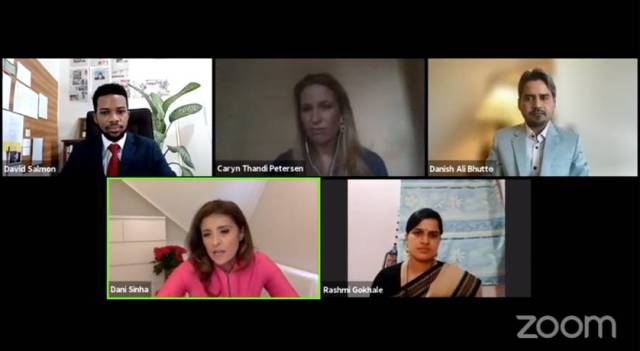
“A Future for Commonwealth Studies?” was the subject for the latest Commonwealth Critical Conversation series held on 18 May.
The Commonwealth Foundation, the Commonwealth Parliamentary Association and the Association of Commonwealth Universities hosted this event. Seamless and slick technology, a welcome by-product of the global pandemic demonstrated the potential of international conferring as we emerge into a new and changed world. 350, mostly young people, from 38 countries took part. Four panellists – David Salman from Jamaica, Rashmi Gokhale from India, Danish Ali Bhutto from Pakistan, Caryn Thandi Peterson from South Africa – discussed three key questions. What should Commonwealth Studies mean today and why do they matter? What are the most important issues that should be studied under the Commonwealth umbrella? Could the Commonwealth benefit from a dedicated Think Tank? Comments, questions and answers from panellists and participants will be shared with the Rifkind Committee, currently looking into the future of Commonwealth Studies at the University of London but this was never a London centred or even Anglo-centric event. Indeed British voices were rare.
There were no Commonwealth-sceptic voices. All the speakers argued with passion that Commonwealth Studies, broadly defined, were more relevant and necessary than ever in this time of Coronavirus, Black Lives Matter, Climate Change, Decolonising Culture and Curricula. David Salman put forward a vision of Commonwealth Studies as “intellectual reparation” and a tool for dealing with current issues, ideologies, inequalities and injustices, supporting endangered democracy and opposing divisive populist politics. Not surprisingly the usual suspects were promoted as subjects of study: human rights, LGBTQ+ rights, sustainable development, counter-terrorism, gender equality. To these Rashmi Gokhale added attention animal rights. We also needed more studies of policy implementation – what worked and what didn’t. All this requires a clear understanding of history and colonial legacies. We cannot change our present and future unless we understand our past.
Without dissension all argued for the strengthening of existing institutions and the founding of new ones – in all parts of the Commonwealth, with emphasis on the inter-connectedness of issues and institutions. Much more should be done to support knowledge exchange, truly equitable exchange not mere tokenism – more Commonwealth scholarships for example, enabling students and academics to work in a variety of Commonwealth countries not just the UK. Time and time again, speakers referred, sometimes stridently, to the unequal distribution of power in the academic and publishing as well as the politico-economic worlds. This raised questions of access to and visibility of research from developing countries. It was good to hear, at this point, David Salman’s praise of The Round Table, as a forum and a journal welcoming to scholars and practitioners all over the world.
More controversially, given that the use of English, without interpreters, is usually considered a sine qua non of Commonwealth membership, several participants queried this linguistic hegemony. Could the Commonwealth do more to accommodate multi-lingualism?
But how, as one brave participant asked, could all these aspirations be achieved without public funding? Caryn Thandi Peterson suggested funding from the legacies of colonialism and slavery but it was hard to see how this might work in practice. There were questions too about how institutions and initiatives could be connected and co-ordinated. Was there a greater role for the Commonwealth Secretariat, the ACU, the Foundation? How might a “Think Tank of Think Tanks” work? The conversation has only just begun.
Terry Barringer is the Assistant Editor of the Round Table journal.
The future of Commonwealth Studies discussion is now available as a video:
Related articles:
A review into the future of the Institute of Commonwealth Studies



